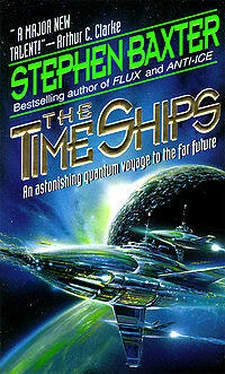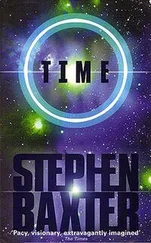I asked Nebogipfel how the Morlocks governed themselves.
He explained to me — in a somewhat patronizing manner, I thought — that the Sphere was a large enough place for several “nations” of Morlocks. These “nations” were distinguished mainly by the mode of government they chose. Almost all had some form of democratic process in place. In some areas a representative parliament was selected by a Universal Suffrage, much along the lines of our own Westminster Parliament. Elsewhere, suffrage was restricted to an elite subgroup, composed of those considered especially capable, by temperament and training, of governance: I think the nearest models in our philosophy are the classical republics, or perhaps the ideal form of Republic imagined by Plato; and I admit that this approach appealed to my own instincts.
But in most areas, the machinery of the Sphere had made possible a form of true Universal Suffrage, in which the inhabitants were kept abreast of current debates by means of the blue windows in their partitions, and then instantly registered their preferences on each issue by similar means. Thus, governance proceeded on a piecemeal basis, with every major decision subject to the collective whim of the populace.
I felt distrustful of such a system. “But surely there are some in the population who cannot be empowered with such authority! What about the insane, or the feeble-minded?”
He considered me with a certain stiffness. “We have no such weaknesses.”
I felt like challenging this Utopian — even here, in the heart of his realized Utopia! “And how do you ensure that?”
He did not answer me immediately. Instead he went on, “Each member of our adult population is rational, and able to make decisions on behalf of others — and is trusted to do so. In such circumstances, the purest form of democracy is not only possible, it is advisable — for many minds combine to produce decisions superior to those of one.”
I snorted. “Then what of all these other Parliaments and Senates you have described?”
“Not everyone agrees that the arrangements in this part of the Sphere are ideal,” he said. “Is that not the essence of freedom? Not all of us are sufficiently interested in the mechanics of governance to wish to participate; and for some, the entrusting of power to another through representation — or even without any representation at all — is preferable. That is a valid choice.”
“Fine. But what happens when such choices conflict?”
“We have room,” he said — heavily. “You must not forget that fact; you are still dominated by planet-bound expectations. Any dissenter is free to depart, and to establish a rival system elsewhere…”
These “nations” of the Morlocks were fluid things, with individuals joining and leaving as their preferences evolved. There was no fixed territory or possessions, nor even any fixed boundaries, as far as I could make out; the “nations” were mere groupings of convenience, clusterings across the Sphere.
There was no war among the Morlocks.
It took me some time to believe this, but at last I was convinced. There were no causes for war. Thanks to the mechanisms of the Floor there was no shortage of provision, so no “nation” could argue for goals of economic acquisition. The Sphere was so huge that the empty land available was almost unlimited, so that territorial conflicts were meaningless. And — most crucially — the Morlocks’ heads were free of the canker of religion, which has caused so much conflict through the centuries.
“You have no God, then,” I said to Nebogipfel, with something of a thrill: though I have some religious tendencies myself, I imagined shocking the clerics of my own day with an account of this conversation!
“We have no need of a God,” Nebogipfel retorted.
The Morlocks regarded a religious set of mind — as opposed to a rational state — as a hereditable trait, with no more intrinsic meaning than blue eyes or brown hair.
The more Nebogipfel outlined this notion, the more sense it made to me.
What notion of God has survived through all of Humanity’s mental evolution? Why, precisely the form it might suit man’s vanity to conjure up: a God with immense powers, and yet still absorbed in the petty affairs of man. Who could worship a chilling God, even if omnipotent, if He took no interest whatsoever in the flea-bite struggles of humans?
One might imagine that, in any conflict between rational humans and religious humans, the rational ought to win. After all, it is rationality that invented gunpowder! And yet — at least up to our nineteenth century — the religious tendency has generally won out, and natural selection operated, leaving us with a population of religiously-inclined sheep — it has sometimes seemed to me — capable of being deluded by any smooth-tongued preacher.
The paradox is explained because religion provides a goal for men to fight for. The religious man will soak some bit of “sacred” land with his blood, sacrificing far more than the land’s intrinsic economic or other value.
“But we have moved beyond this paradox,” Nebogipfel said to me. “We have mastered our inheritance: we are no longer governed by the dictates of the past, either as regards our bodies or our minds…”
But I did not follow up this intriguing notion — the obvious question to ask was, “In the absence of a God, then, what is the purpose of all of your lives?” — for I was entranced by the idea of how Mr. Darwin, with all his modern critics in the Churches, would have loved to have witnessed this ultimate triumph of his ideas over the Religionists!
In fact — as it turned out my understanding of the true purpose of the Morlocks’ civilization would not come until much later.
I was impressed, though, with all I saw of this artificial world of the Morlocks — I am not sure if my respectful awe has been reflected in my account here. This brand of Morlock had indeed mastered their inherited weaknesses; they had put aside the legacy of the brute — the legacy bequeathed by us — and had thereby achieved a stability and capability almost unimaginable to a man of 1891: to a man like me, who had grown up in a world torn apart daily by war, greed and incompetence.
And this mastery of their own nature was all the more striking for its contrast with those other Morlocks — Weena’s Morlocks — who had, quite obviously, fallen foul of the brute within, despite their mechanical and other aptitudes.
[14]
Constructions and Divergences
I discussed the construction of the Sphere with Nebogipfel. “I imagine great engineering schemes which broke up the giant planets — Jupiter and Saturn — and—”
“No,” Nebogipfel said. “There was no such scheme; the primal planets — from the earth outward — still orbit the sun’s heart. There would not have been sufficient material in all the planets combined even to begin the construction of such an entity as this Sphere.”
“Then how—?”
Nebogipfel described how the sun had been encircled by a great fleet of space-faring craft, which bore immense magnets of a design — involving electrical circuits whose resistance was somehow reduced to zero — I could not fathom. The craft circled the sun with increasing speed, and a belt of magnetism tightened around the sun’s million-mile midriff. And — as if that great star were no more than a soft fruit, held in a crushing fist great founts of the sun’s material, which is itself magnetized, were forced away from the equator to gush from the star’s poles.
More fleets of space-craft then manipulated this huge cloud of lifted material, forming it at last into an enclosing shell; and the shell was then compressed, using shaped magnetic fields once more, and transmuted into the solid structures I saw around me.
Читать дальше
Конец ознакомительного отрывка
Купить книгу









